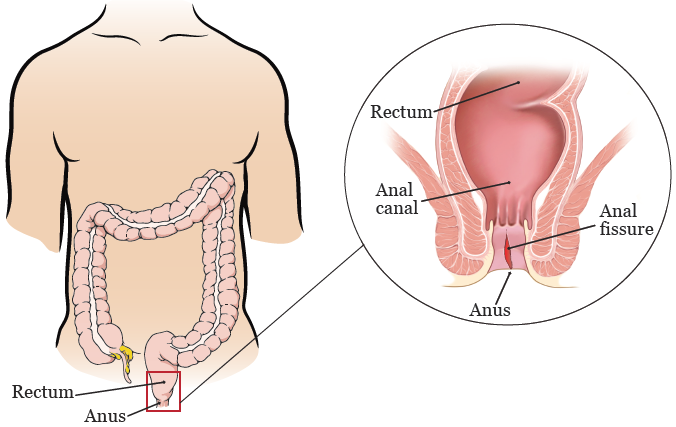This information explains the causes, symptoms, and treatment of anal fissures.
Anal Fissures
An anal fissure is a small tear or rip in the lining of your anal canal. Your anal canal is the short tube that connects your rectum (the bottom section of your colon) to your anus (see Figure 1).

Anal fissures can make having a bowel movement (pooping) very painful. The pain may make it hard for you to have a bowel movement, causing constipation (having fewer bowel movements than usual). They can also cause bleeding from your anus.
Anal fissures don’t cause colon cancer or increase your risk of getting colon cancer.
Causes of Anal Fissures
The most common cause of anal fissures is injuring the lining of your anus. This can happen when you:
- Have large bowel movements (poop)
- Have hard, dry bowel movements
- Have diarrhea (loose or watery bowel movements)
- Are constipated
- Strain or use force during your bowel movements
- Give birth
- Have anal sex
You may also develop an anal fissure if you have an anal infection or an anal tumor. These are less common.
Symptoms of Anal Fissures
Anal fissures may cause:
-
A sharp, stinging pain during bowel movements. This pain may last for a few minutes to a few hours after a bowel movement. You may also feel a cutting or tearing feeling during your bowel movements.
- The pain may cause you to hold in your bowel movements, making you constipated.
- This can lead you to have a harder bowel movement, which can make your anal fissure worse.
- The pain may also cause the muscles around your anal canal to spasm.
- This spasm prevents your anal fissure from healing and leads to more pain. This is called the fissure cycle.
- The pain may cause you to hold in your bowel movements, making you constipated.
- Bright red blood in your bowel movements or on your toilet paper after a bowel movement.
- A skin tag (small lump of skin) near the anal fissure. This is more likely to happen if you have chronic anal fissures (anal fissures that last for longer than 8 weeks).
Treatment for Anal Fissures
Here are some ways you can treat your anal fissure on your own:
- Follow a high-fiber diet or take fiber supplements (such as psyllium husk, Benefiber®, and Metamucil®) to make your bowel movements softer. For more information, read our resource A Guide to High Fiber Foods.
- Drink 8 (8-ounce) glasses of water daily to help prevent hard bowel movements.
-
Take warm sitz baths for 10 to 20 minutes a few times a day and after bowel movements. A sitz bath is a warm, shallow bath that cleanses your anus.
- You can use your bathtub or buy at your local pharmacy a plastic sitz bathtub that fits over your toilet.
There are also medications you can take to help treat anal fissures. Your healthcare provider will talk with you about the benefits and side effects of these medications. Examples of these medications include:
- Take stool softeners or laxatives (medication to help you have a bowel movement), such as Docusate Sodium (Colace®) or Senna (Senokot®), to make your bowel movements softer. Your healthcare provider will tell you how to take this medication if needed.
- Apply a topical local anesthetic (numbing medication that you put on your skin), like lidocaine (such as RectiCare®), around your anus to help with the pain.
-
Apply a medication to relax the muscles around your anal canal. Relaxing the muscles around your anal canal can help reduce pressure, relieve pain, and make it easier for you to have a bowel movement.
- Your healthcare provider will give you a prescription for one of these medications, such as topical diltiazem or nitroglycerin (such as Rectiv®) ointment, and tell you how to apply it. Make sure to wear disposable gloves when applying these medications.
If these treatment options don’t help your anal fissure, your healthcare provider may recommend other treatments, such as surgery. Your healthcare provider will give you more information if other treatments are an option for you.
Preventing Anal Fissures
You can prevent anal fissures by avoiding constipation and diarrhea. For more information on how to do this, read our resources Managing Constipation and Managing Diarrhea.
You can also prevent anal fissures by following a healthy diet. For more information about following a healthy diet to prevent anal fissures, call Memorial Sloan Kettering’s (MSK) Nutrition Services at 212-639-7312.
Anal Fissures and Colon Cancer
People with colon cancer may develop anal fissures, but anal fissures don’t cause colon cancer or increase your risk of getting colon cancer.
Even if your anal fissure heals completely, it can come back after you have a hard bowel movement. This doesn’t mean you have colon cancer.
If your anal fissure doesn’t get better with treatment or comes back, call your healthcare provider.